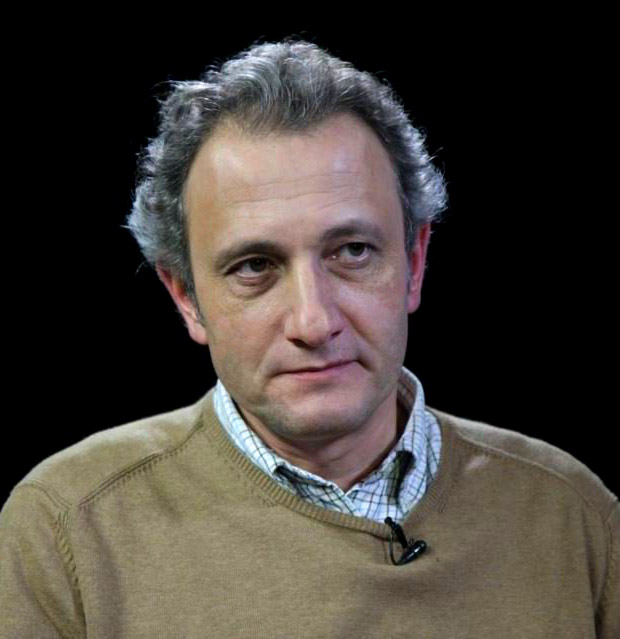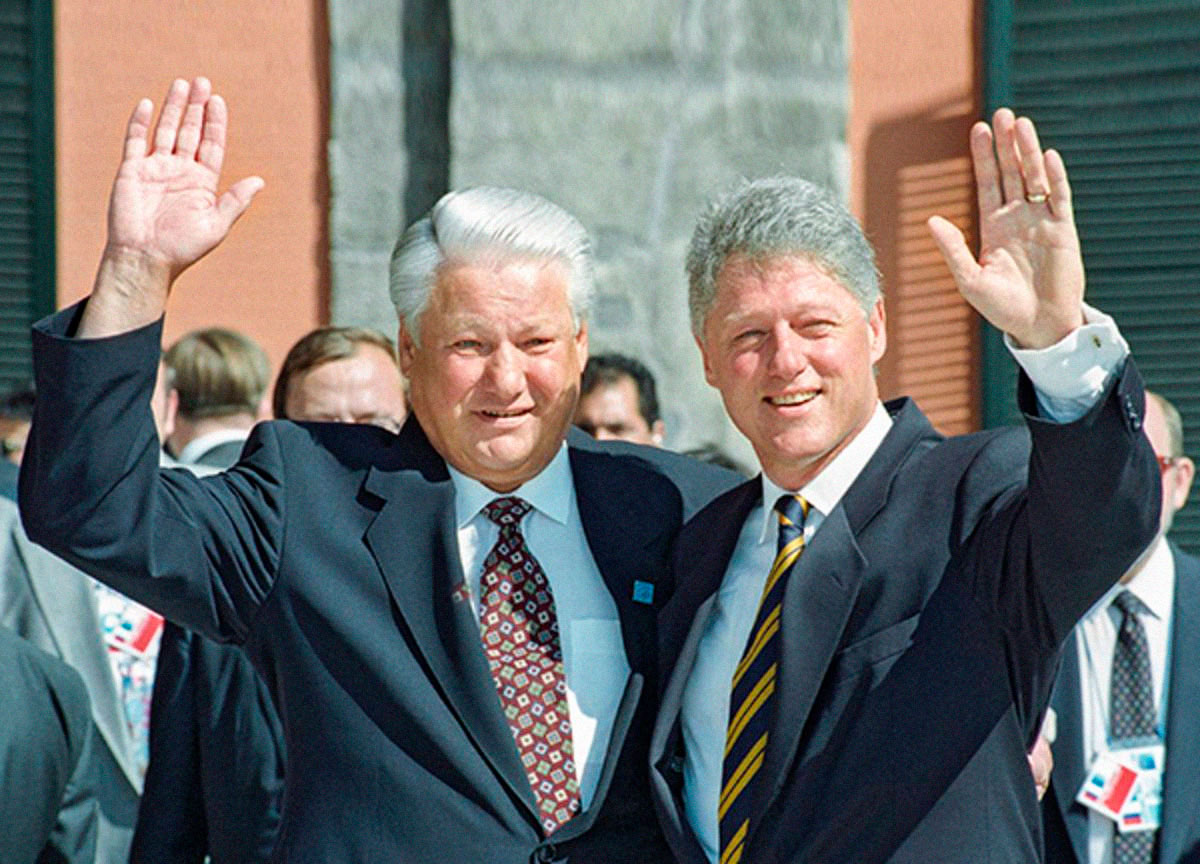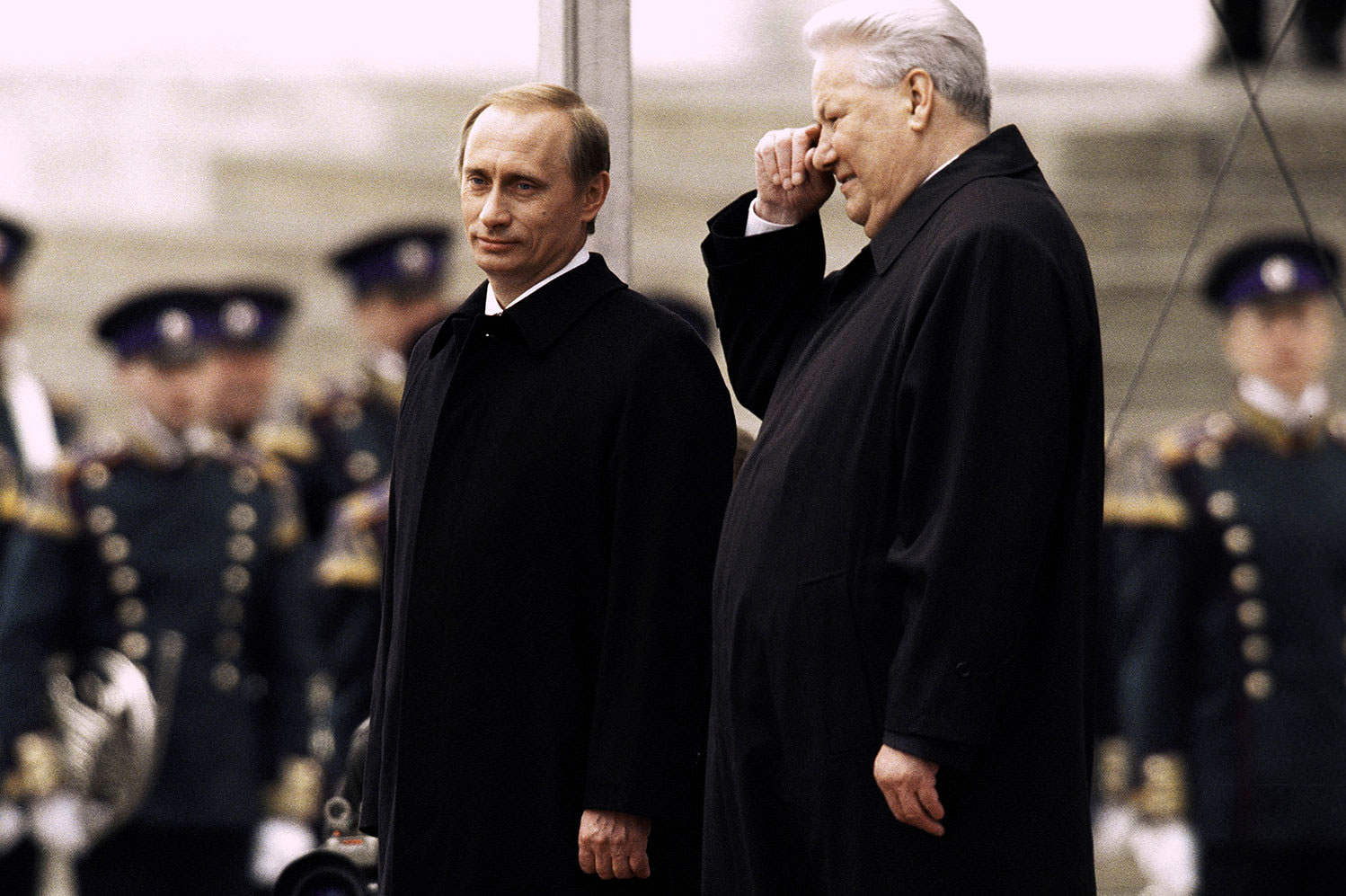 Vladimir Putin and Bill Clinton dined on June 3, 2000, at the Kremlin residence of the Russian president. The conversation was quite tense: Clinton and his intellectual team, which, unlike the current one, was well-versed in Russian affairs, had not yet found the key to Putin's cipher (looking ahead, it must be said that they deciphered it incorrectly, deciding with relief that the new president of Russia was sincerely intending to move closer to the West). Boris Yeltsin's successor opposed the American national missile defense plan. Despite seemingly understanding that the plan was directed against the missile programs of North Korea and Iran, as Clinton explicitly stated, urging, according to Strobe Talbott, who was present at the conversation, 'to worry less about Russia's vulnerability to an American nuclear strike and more about the danger posed to both countries by nuclear proliferation'.
Vladimir Putin and Bill Clinton dined on June 3, 2000, at the Kremlin residence of the Russian president. The conversation was quite tense: Clinton and his intellectual team, which, unlike the current one, was well-versed in Russian affairs, had not yet found the key to Putin's cipher (looking ahead, it must be said that they deciphered it incorrectly, deciding with relief that the new president of Russia was sincerely intending to move closer to the West). Boris Yeltsin's successor opposed the American national missile defense plan. Despite seemingly understanding that the plan was directed against the missile programs of North Korea and Iran, as Clinton explicitly stated, urging, according to Strobe Talbott, who was present at the conversation, 'to worry less about Russia's vulnerability to an American nuclear strike and more about the danger posed to both countries by nuclear proliferation'.
After the conversation, which preceded the official negotiations on June 4 and 5, Putin showed his colleague his residence, including a personal chapel with a baptismal font and some unused room, which was 'a clinic for the predecessor'. Clinton noted that just before leaving Moscow, he would visit Yeltsin and clarified whether the first president of Russia lived in the same residence as before. Putin confirmed the assumption, adding: 'I allowed him to stay there'.

President of the Russian Federation Boris Yeltsin and President of the USA Bill Clinton, 1994. Photo: A. Sentsov, A. Chumichev / TASS
I. Allowed. Him. To. Stay. Which means he could not have allowed it. Although Yeltsin's team chose Putin partly based on reliability — he would not touch the Family (political) and family (physical), and would preserve Yeltsin's legacy — in all other senses of the word.
Dropping Protective Settings
The details of the negotiations between Putin and Clinton, who was becoming a 'lame duck' at the time (his term ended on January 21, 2001), are detailed in the recently publicly available transcripts of conversations stored in the US National Security Archive. The published record of the last conversation was made by Deputy Secretary of State Strobe Talbott and coincides with his account of events in the 2002 book The Russia Hand. A Memoir of Presidential Diplomacy (in Russian translation 'Bill and Boris. Notes on Presidential Diplomacy').

President of Russia Vladimir Putin and President of the USA Bill Clinton walking in the Kremlin, 2000. Photo: Sputnik / Vladimir Rodionov
Clinton often got irritated in conversations with Putin, especially when constantly returning to the topic of national missile defense. At the end of the negotiations on June 5, the US president told Talbott: 'This guy decided that I didn't understand anything the first time. Either he's a fool, or he thinks I'm a fool'. After which he went with relief to see 'old Boris'. The farewell with Yeltsin was quite touching, although Boris Nikolayevich first fulfilled Putin's request, who asked to convey to his friend Bill that 'Russia will only pursue its own interests'. Clinton was not just saying goodbye to Yeltsin — he was saying goodbye to the times of trusting cooperation between Russia and the USA, Russia and the West, and, as it turned out, a brief period of Russian democracy.
The transcripts of the June 2000 conversations were released almost simultaneously with the decision of the Verkh-Isetsky District Court of Yekaterinburg, which on August 20 imposed a fine on the first deputy executive director of the 'Yeltsin Center' (YC) Lyudmila Telen under an administrative article on discrediting the Armed Forces of Russia. The attack on the 'Yeltsin Center' has been going on for more than a month, if not a year, but the administrative case, firstly, signifies the transition of the war with Yeltsin's legacy into a new, judicial-official quality, and secondly, the administrative case was initiated for Lyudmila Telen's repost of an old anti-war post by Yeltsin's daughter Tatyana Yumasheva. The punishable event itself occurred, naturally, more than three years ago.
Destroying the 'YC' is beyond the power of such regime heavyweights as the tireless Nikita Mikhalkov or the presidential envoy in the Ural District Artem Zhoga, who was pulled from the Kremlin administration when he started his new career with attacks on the center. But paralyzing the center's activities — both in the Urals and in Moscow — is a completely solvable task. Just over the past summer in Yekaterinburg, about ten events were canceled, including those obviously depoliticized. The disgusting campaign launched in pro-government media with mountains of lies about Lyudmila Telen was intended to show the pro-Western and, even worse in today's understanding, almost pro-Israeli position of the liberals entrenched in the 'Yeltsin Center'. Moreover, it turns out, under the 'roof' of the Kremlin: the head of the board of trustees is the head of the presidential administration of the Russian Federation Anton Vaino. Among others, Alexander Voloshin and deputy head of the administration Alexei Gromov are on the board. As well as Valentin Yumashev and Tatyana Yumasheva.
Some kind of administrative resource, let's say delicately. And this resource was not enough to protect the representative of the 'Yeltsin Center' leadership from deliberately specific administrative persecution. So, we draw the first conclusion, there is a more powerful resource against which there is no antidote. And the second conclusion, prompted by the general situation with the persecution of establishment representatives, including the case of Roman Starovoit: no one in the system is going to stand up for anyone — or cannot, or does not want to, or this 'no one', even if he holds a high position in the state or informal patron-client hierarchy, does not listen to the first person. In a somewhat parodic way, this new arrangement of state mechanics was confirmed when the pro-Kremlin blogger Sergey Markov was hit with foreign agent status for a single misstep with a misunderstood policy towards Azerbaijan. And so it will be with everyone...
This is a rather significant change in the arrangement of 'intra-elite' relations in the Putin system, when all protective settings are dropped. However, in the case of the 'Yeltsin Center', there is also its historical-political meaning: an open (and not deflected) blow was dealt to the Family and family of Boris Yeltsin. It was also dealt to the repository of his personal legacy and memory (at least memory) of liberal values, and to a family member, the daughter of the first president. To those who elevated Putin to the throne. No one should be confused by the fact that the blow was dealt indirectly, through the administrative punishment of a leading employee.
Now the Yeltsin era is definitely over. In all senses.
'We Will Miss Him'
In the famous documentary film by Vitaly Mansky 'Putin's Witnesses', there are symptomatic shots: Yeltsin, surrounded by a jubilant family after Putin's victory in the 2000 elections, tries to congratulate his successor — that is, simply to call him. And not only can't he get through: he waits for Putin to call him back. Not waiting, humiliated, he goes to sleep.

Vladimir Putin and the first president of Russia Boris Yeltsin on Putin's inauguration day, May 7, 2000. Photo: Vladimir Vyatkin / RIA Novosti
This is all Putin, as in the phrase 'I allowed him to stay there'.
Let's return to June 5, 2000. Clinton is visiting Yeltsin. Next to them are Strobe Talbott and the ex-president's daughter Tatyana Dyachenko, later Yumasheva. Talbott recalls:
'...When Yeltsin began to boast about how he brought Putin from obscurity to the presidency despite fierce resistance, Tatyana looked at me and nodded seriously. Then she leaned towards me and whispered: 'It was really very difficult to elevate Putin to this position. One of the most difficult things we've ever managed'.
On the way to Moscow, Clinton was very gloomy. 'Perhaps,' — he said to Talbott, — we've seen old Boris for the last time. I think we'll miss him'....'
From the height of a quarter of a century that has passed since then, the correctness of the words of the 42nd president of the USA is beyond doubt.
* Andrey Kolesnikov is considered a 'foreign agent' by the Ministry of Justice of the Russian Federation.